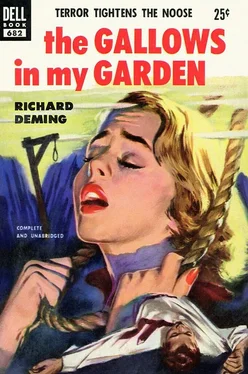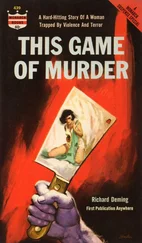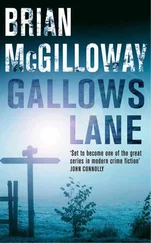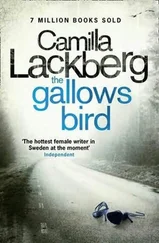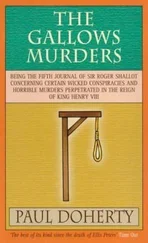Ann’s expression had gradually changed from one of surprise to utter astonishment. “But Donald couldn’t have been murdered. My husband, I mean, not young Don. It was an auto accident. The chauffeur skidded on wet pavement and went over a twenty-foot bank.”
“Was the chauffeur killed, too?” I asked.
“No.” She looked puzzled, then went on slowly. “But if you think he might have done it deliberately, you’ll have to think again. The chauffeur broke three ribs, an elbow, nearly lost an eye, and was hospitalized six weeks. Would a murderer go to all that trouble?”
“Doesn’t seem likely,” I admitted. “Anyone else injured?”
“Douglas — Doctor Lawson sprained an ankle and broke his nose. He and Donald were riding in the back seat, you see. Donald was thrown over the seat against the windshield, but Douglas only slammed forward against the front seat.” She paused, then stated quietly, “My husband’s neck was broken, and he died instantly.”
I muttered something about the whole thing being one of my stupider ideas and I was sorry I brought it up. As an afterthought I asked what had become of the chauffeur.
“I really don’t know,” Ann said. “Since both the children and I preferred to drive ourselves, we had no use for a chauffeur after Donald was gone. Of course I kept track of him for a month or two after he got out of the hospital, but he didn’t seem to need any help. He got well over a thousand dollars in addition to medical expenses from the insurance people, you see, so he wasn’t in financial difficulties.”
“What was his name?”
“Vance. Vance Logan. He lived somewhere on Sixth with a married sister for a time after leaving the hospital. But I seem to remember hearing he’d moved into an apartment of his own. Possibly you’d find it in the phone book if you want to look him up.”
“He probably couldn’t add anything important,” I said noncommittally. “Let’s try another angle. I know practically nothing about the background of anyone in this case. Maybe if you filled in the outlines, we might uncover a possible motive.”
“All right,” she said. “I’m willing to help any way I can. With whom shall I start?”
I grinned at her. “Let’s start with you.”
She smiled without exhibiting any surprise. “I really haven’t much background, I’m afraid. My parents were poor but honest. Dad was a bank teller twenty years, and died the year they made him assistant cashier. I was thirteen at the time and had four younger brothers. I passed up high school in favor of a two-year secretarial course, got a stenography job with Lawson Drugs at fifteen, and helped out the family until the last boy was through high school. By that time I was twenty-two and had worked up to Mr. Lawson’s private secretary. A year later we were married.”
“A modern Cinderella,” I suggested without irony.
She flushed and said with the faintest trace of anger, “I did not marry Donald for his money, if that’s your implication. I never pretended even to him that I was fired with a deep and burning love, but I was fond of him and I respected him, and would have married him had he been a grocery clerk.” She eyed me with a kind of inward perplexity, then went on patiently, “You have to understand I’d never really known any other men. This may strike you as strange, for I’m aware I’m not an entirely unattractive woman now, but until I was twenty-two I doubt that most men ever gave me a second glance. Not that I blossomed overnight from a weed into a beautiful flower, but from fifteen on I turned in so much of my money at home, I never could afford beauty parlors and decent clothes.”
She laughed ruefully. “I wore my hair straight back with a knot at the nape of my neck, used no make-up, and dressed in ‘sensibly tailored’ suits. I’m afraid I was regarded by older people as a good example and by my fellow office workers as a stick-in-the-mud. When my youngest brother finally finished school and got a job just three months after Mom died, I suddenly discovered all the money I made was mine. But being so used to living on practically nothing, before I knew it I had saved two hundred dollars.”
A light of amused reminiscence appeared in her eyes, and she smiled self-consciously. “On my twenty-second birthday I went downtown and spent every cent of the two hundred on clothes and a beauty course. A week later I Was private secretary to Donald.”
“An interesting history,” I told her, “but I’m afraid I can’t detect any murder motives in it. Let’s go on to — say, Jonathan Mannering.”
A slight flush had appeared on Ann’s face when I paused after “Let’s go on to—” but it disappeared to be replaced by mild relief when I mentioned Mannering. It didn’t take a psychoanalyst to deduce the flush was caused by anticipation that I was going to bring up Doctor Lawson.
“Jonathan’s life has been as easy as mine was hard,” Ann said. “Everything was planned for him even before he was born. Jonathan is the sole surviving member of the firm of Mannering, Mannering, and Mannering, the first two having been his grandfather and his father. All three attended Harvard Law School — at different times, of course — and I suppose there isn’t a more trustworthy law firm in the country. Or a stuffier one. They handle no criminal cases or divorces, restricting their clientele to large corporations, though they do give legal service to families connected with the corporations retaining them. Jonathan’s grandfather, who founded the firm, was probably well off, his father was considered moderately wealthy, and I suppose Jonathan himself is rich.” A half-smile lit her face at some inner thought. “He must be, for he’s been accumulating money all his life, and I’ve never seen him spend any.”
I said, “He’s executor for the estate, isn’t he?”
“Yes, but you won’t find a motive there, in case you think he may have been dipping into it. I’m sure Jonathan has all the money he could spend for the rest of his life, and he has no heirs. Then, too, though he’s a bit dull, he’s scrupulously honest.”
Any way I looked at it, Jonathan Mannering failed to make a very promising suspect. “Let’s try Gerald Cushing,” I suggested.
“I don’t know Gerald as well as Jonathan,” Ann said. “I’ve known Jonathan ever since I became Mrs. Lawson, for he and Donald were personal friends. Donald and Douglas lived in the Mannering home for six years after their parents died, you see, and came to regard Jonathan as a sort of foster uncle. But I’ve really only known Gerald well since Donald died. I knew him as an acquaintance, of course, for he was first vice-president of Lawson Drugs until my husband’s death, after which he became president of the board of directors and at the same time assumed the position of general manager of the whole chain. I really can’t tell you much about Gerald except he came from a wealthy family, is a widower without children, and owns about ten percent of the stock in Lawson Drugs. My husband thought very highly of him.”
“Maybe he would like to own more of the stock,” I suggested.
Ann frowned. “How could he accomplish that by murder? He isn’t mentioned in the will.”
I shrugged. “To date we haven’t discovered how anyone accomplished anything by killing Don, or could by killing Grace. Tell me about your aunt, Miss Stoltz.”
“She’s a sister of my father’s,” Ann said. “I never met her until after my marriage, because she went to Paris before I was born and lived there twenty-five years. When she returned to the States about five years ago, she looked me up, decided to settle in town, and has kept an apartment at the Plaza ever since.”
Читать дальше
